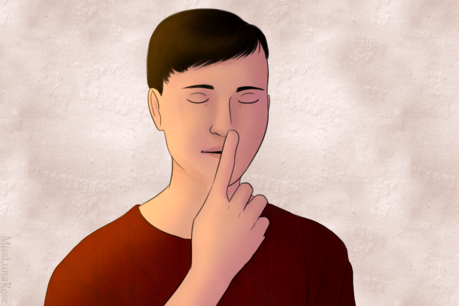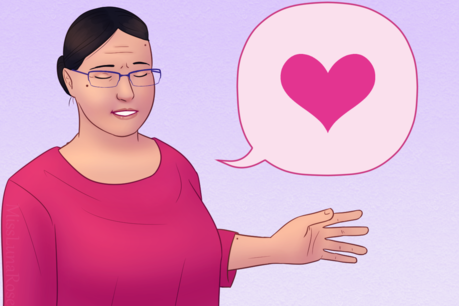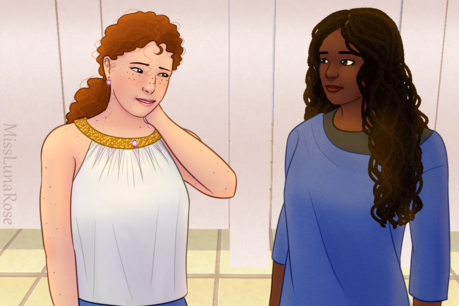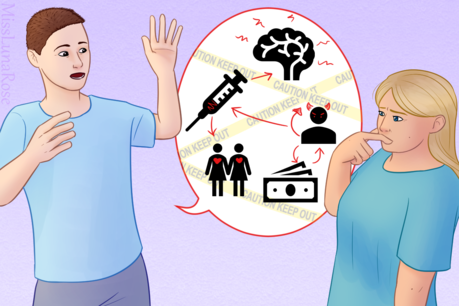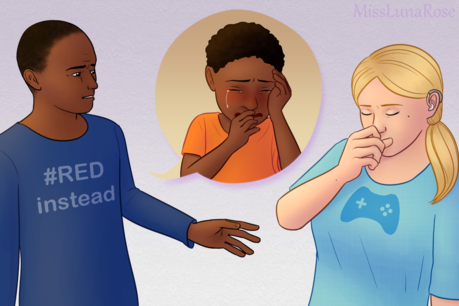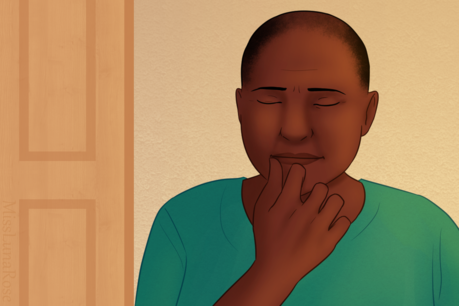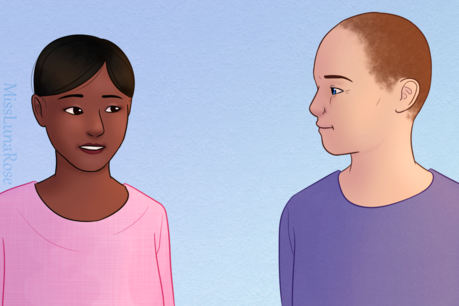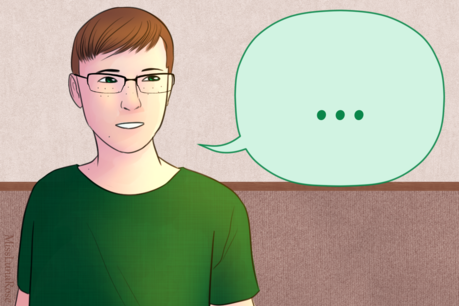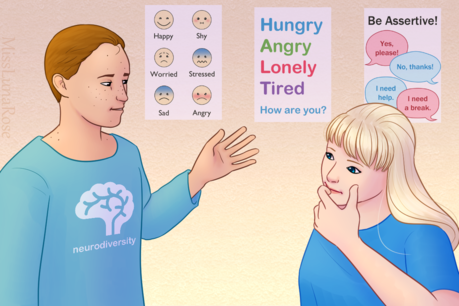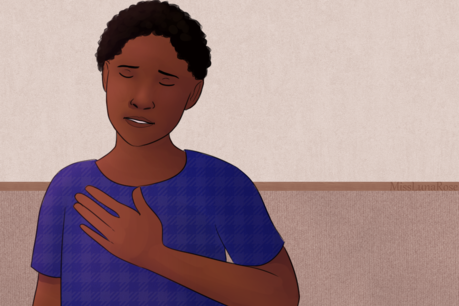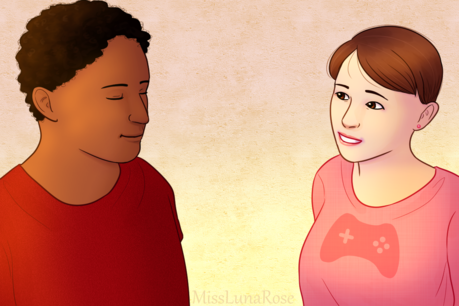How to Stop Giving Terrible Advice
Method 1 of 2:
Avoiding Common Mistakes
-
 Keep your personal beliefs personal. Everyone has their own opinions and beliefs, including ideas about politics and religion and how to live a good lifestyle. Your beliefs might work well for you, but they might not work well for everyone, so don't try to impose them.
Keep your personal beliefs personal. Everyone has their own opinions and beliefs, including ideas about politics and religion and how to live a good lifestyle. Your beliefs might work well for you, but they might not work well for everyone, so don't try to impose them.- Remember that your life experiences have shaped your beliefs, and how you solve problems. For example, a white person might be able to "just ignore" a racist coworker, but that might not be so easy for a black person who is being targeted.
- Try to be accommodating of all good-faith beliefs. Unless the other person's belief is hurting someone else (e.g. "I think it's OK to bully gay people"), then you should respect that their opinion is different.
-
 Avoid telling someone whatever they want to hear. Sometimes, people just tell someone whatever the person wants, because they want to gain favor, or they want to end the conversation, or they just don't know what to do. It's not always wise to be a "yes man" or "yes woman." Instead of telling someone whatever they want to hear, think a little first, or avoid giving advice.
Avoid telling someone whatever they want to hear. Sometimes, people just tell someone whatever the person wants, because they want to gain favor, or they want to end the conversation, or they just don't know what to do. It's not always wise to be a "yes man" or "yes woman." Instead of telling someone whatever they want to hear, think a little first, or avoid giving advice.- If you aren't sure how to help, just say "I'm honestly not sure what to tell you. What do you think is the best way to handle this?"
- If you're too busy or disinterested to help, be honest. Say "I don't think I'm the best person to help you with this" or "I am overwhelmed with work right now, so if you want a good listener, we can talk about it tomorrow once I can focus better."
- Avoid immediately placing blame if someone tells you about a difficult situation. You haven't heard other sides of the story, and there may be some important information that the person wasn't aware of. Instead, empathize and try to avoid judging anyone right away.
- Never enable risky behavior like excessive drinking, dangerous drug use, drunk driving, et cetera. Sometimes, the kindest choice is to speak up, even if it's scary. Say "This isn't safe, and I care about you too much to let you get hurt."
-
 Never give advice just for personal gain. If you have secret motives behind your advice, and people find out, this could really damage your relationships and your reputation. For example, if you advise your friend to dump her boyfriend because you want to date him, your friend could feel like you used or betrayed her.
Never give advice just for personal gain. If you have secret motives behind your advice, and people find out, this could really damage your relationships and your reputation. For example, if you advise your friend to dump her boyfriend because you want to date him, your friend could feel like you used or betrayed her.- It can be fun to sell things like makeup, lingerie and party items from home. Just don't be pushy––sell the benefits generally, and don't use your personal knowledge of friends and neighbors to force a decision upon them through tailored advice. Never take advantage.
-
 Keep quiet about something you don't fully understand. Don't assume that you understand something just because you read an article, watched a show, or read a book about it. There may be nuances you don't know of yet. If someone's problem is related to an area (like law, a medical condition, fixing cars, etc.) that you don't know much about, encourage them to ask an expert for advice.
Keep quiet about something you don't fully understand. Don't assume that you understand something just because you read an article, watched a show, or read a book about it. There may be nuances you don't know of yet. If someone's problem is related to an area (like law, a medical condition, fixing cars, etc.) that you don't know much about, encourage them to ask an expert for advice.- Know the power of a good "I don't know." Admit your limited experience, and encourage them to seek out someone who knows more. They'll likely think of you as wise.
- Keep in mind that the person may have much more experience with the area than you do. For example, if someone has lived with a health condition for 10 years, and you have little experience with it, it would be inappropriate for you to tell them how to manage it.
- Remember that not everything you read is true. Some things are exaggerated, unhelpful, or just plain wrong. Even scientific findings can later be disproven and replaced with new advice.
- Keep your reputation in mind. If you pretend to know a lot about something, when you really don't, people might think you are pretentious, or a fool. It's better to just admit your limits.
-
 Remember that your life experiences are different from theirs. Don't assume that you understand their life, based on your own experiences or what you have read. Different things help different people, and what works for you may not work for them. You can try to put yourself in their shoes, but even then, you may not perfectly understand.
Remember that your life experiences are different from theirs. Don't assume that you understand their life, based on your own experiences or what you have read. Different things help different people, and what works for you may not work for them. You can try to put yourself in their shoes, but even then, you may not perfectly understand.- Be careful about solutions that seem easy. It's easy for a non-smoker to say "just quit smoking" or a mentally healthy person to say "just do more yoga!" The situation may be a lot more complicated than you realize, and your "quick fix" may come off as dismissive.
- Avoid giving unsolicited "expert" advice. The person may have already tried that advice, or it may be bad advice.
-
 Be very careful about relationship advice. It's only natural to want to see your loved ones happy, and to want to fix things for them when you think they aren't getting everything they deserve. But if you push too hard, you might just make your loved one feel pressured, and they might be less eager to open up to you in the future.
Be very careful about relationship advice. It's only natural to want to see your loved ones happy, and to want to fix things for them when you think they aren't getting everything they deserve. But if you push too hard, you might just make your loved one feel pressured, and they might be less eager to open up to you in the future.- Remember that in long-term relationships, advice like "dump her" or "divorce him" is a big deal. Avoid saying these things unless the person is open to hearing them, and the case is quite clear-cut.
Method 2 of 2:
Being Helpful
-
 Listen nonjudgmentally. Leaping to judgments, about the speaker or about other people involved in a problem, can hinder your ability to understand and give good advice. Try to remember that you don't know all of the story, and that people may have good reasons even if their choices seem bad.
Listen nonjudgmentally. Leaping to judgments, about the speaker or about other people involved in a problem, can hinder your ability to understand and give good advice. Try to remember that you don't know all of the story, and that people may have good reasons even if their choices seem bad.- For example, if your sister's boyfriend is late, don't rush to criticize him. (Instead, empathize with her frustration.) It's possible that he was stuck in traffic, or had an emergency, or was dealing with something you don't know about.
-
 Validate their feelings before trying to fix anything. Sometimes, people talk about their feelings just because they want someone to make them feel understood, and less alone. By validating someone's feelings, you may be incredibly helpful, without giving a word of advice. Here are some examples of validation:
Validate their feelings before trying to fix anything. Sometimes, people talk about their feelings just because they want someone to make them feel understood, and less alone. By validating someone's feelings, you may be incredibly helpful, without giving a word of advice. Here are some examples of validation:- "I'm sorry to hear that. That sounds rough."
- "I can tell this is difficult for you. Take your time. I'm right here."
- "This is hard. Of course you have feelings about it."
- "I'm not surprised you're nervous. Lots of people hate giving presentations."
- "You're allowed to be angry about this."
- "It's okay to be scared of flying. We all have our own fears, and that's not wrong."
- "Of course you're upset. What you went through was unfair."
-
 Ask if they want advice, before you start giving it. Not everyone wants advice, and if you start giving them unsolicited advice, then you might make them feel ignored or not in control. Instead, put them control by asking "Do you want advice, or do you just need to vent?"
Ask if they want advice, before you start giving it. Not everyone wants advice, and if you start giving them unsolicited advice, then you might make them feel ignored or not in control. Instead, put them control by asking "Do you want advice, or do you just need to vent?"- If they say they don't want advice, respect that. Go back to listening and validating.
-
 Acknowledge your limitations as an advice-giver. Use tentative language, like "maybe" and "perhaps." Recognize differences, by saying things like "if I were in your shoes" or "what helped me once was..." without saying that the person has to do things your way. This shows humility, and empowers the person to choose whether they want to use your suggestion or not. Here are examples of humble advice:
Acknowledge your limitations as an advice-giver. Use tentative language, like "maybe" and "perhaps." Recognize differences, by saying things like "if I were in your shoes" or "what helped me once was..." without saying that the person has to do things your way. This shows humility, and empowers the person to choose whether they want to use your suggestion or not. Here are examples of humble advice:- "You're right, that is bad. If I came home to that, I'd start reconsidering the relationship. Of course, I'm not you—How are you feeling about it?"
- "I'm no parent, so I have no experience. But I do remember something my dad did that once helped with a similar problem. Do you want to hear about it?"
- "This is just a brainstorm. Feel free to ignore any of my advice if it doesn't sound useful."
- "Taking melatonin helped with my sleep problems. It may be worth a try, if you think it's a good idea."
- "I'm no expert on ADHD, for sure. But I do remember reading somewhere that fidgeting can be beneficial for people with ADHD. Does your daughter have any fidget toys that might help?"
- "I'm afraid I know nothing about that. You might get better advice talking to a specialist."
-
 Look for harm reduction if the situation is beyond your control. You can't stop every bad situation or every bad choice. But you can do something to make things a little less bad, or console the person. If someone is determined to behave dangerously, or someone can't leave a difficult situation, you can offer ideas to make things a little safer.
Look for harm reduction if the situation is beyond your control. You can't stop every bad situation or every bad choice. But you can do something to make things a little less bad, or console the person. If someone is determined to behave dangerously, or someone can't leave a difficult situation, you can offer ideas to make things a little safer.- "If you're going to have a lot of casual sex, you may want to consider keeping some condoms with you."
- "I can't make your boyfriend treat you better. But I can offer my place as somewhere to stay, whenever you need it."
- "It may help to have a ride planned for after your night of drinking, so you know you can get home safe."
- "I wish I could take away the pain and magically heal you. But I can come over with takeout, Ibuprofen, and a movie. Sound good?"
-
 Ask what they think. Make an advice session be a collaborative discussion, not a lecture. Ask questions to clarify things, or encourage them to reflect and think of new things.
Ask what they think. Make an advice session be a collaborative discussion, not a lecture. Ask questions to clarify things, or encourage them to reflect and think of new things.- "So what have you tried so far?"
- "You mentioned that you didn't think _____ would work. May I ask why not?"
- "I'm confused. What do you mean by that?"
- "I'm not sure. What do you think?"
Share by
David Pac
Update 24 March 2020
